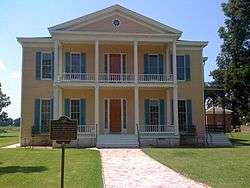Lycurgus Johnson
| Lycurgus Johnson | |
|---|---|
| Born |
Lycurgus Leonidas Johnson March 22, 1818 Scott County, Kentucky |
| Died |
August 1, 1876 Wilmington, Delaware |
| Residence | Lakeport Plantation |
| Occupation | Planter, politician |
| Spouse(s) | Lydia Taylor |
| Children | 12 |
| Parent(s) |
Joel Johnson Verlinda Offutt Johnson |
| Relatives |
Robert Johnson (paternal grandfather) Richard Mentor Johnson (uncle) Benjamin Johnson (uncle) Henry Johnson (uncle) Margaret Johnson Erwin Dudley (cousin) Robert Ward Johnson (cousin) |
Lycurgus Johnson (1818-1876) was an American cotton planter and large slaveholder in the Arkansas Delta during the Antebellum South. He was the owner of the Lakeport Plantation in Chicot County, Arkansas. He became the largest cotton producer in Chicot County by 1870. He served in the Arkansas House of Representatives in 1874.
Early life
Lycurgus Johnson was born on March 22, 1818 in Scott County, Kentucky.[1][2] His father, Joel Johnson, was a Kentucky-born plantation owner along the shores of Lake Chicot in the Arkansas Delta.[1][2] His mother was Verlinda Offutt Johnson.[1] He had eight siblings.[1]
His paternal grandfather, Robert Johnson, was a surveyor in Kentucky.[1] One of his paternal uncles, Richard Mentor Johnson, served as the ninth Vice President of the United States under President Martin Van Buren from 1837 to 1841.[1] Another uncle, Benjamin Johnson, served as a United States federal judge in Arkansas.[1] Yet another uncle, Henry Johnson, became a large landowner and slaveholder in Mississippi, whose daughter, Margaret Johnson Erwin Dudley (Johnson's cousin), became the owner of the Mount Holly plantation on Lake Washington.
Career

Johnson acquired land in Chicot County, Arkansas for agricultural development in the mid-1830s.[1][2] In 1857, he inherited his father's plantation, known as Lakeport.[1] Together with his original landholdings, he owned 4,000 acres in the Arkansas Delta by 1860.[1]
Johnson was a large slaveholder, owning 155 African slaves by 1860.[2] He also owned "thirty horses, fifty-five asses and mules, sixteen milk cows, thirty working oxen, thirty-five other cattle, forty sheep, and sixty swine."[2]
Johnson mostly grew cotton and corn. By 1860, his harvest was 1,300 bales of cotton and 10,000 bushels of corn.[1] Additionally, it included "two hundred bushels of sweet potatoes and five hundred pounds of butter."[2]
Johnson built a mansion on the plantation.[1] He owned seven or eight house servants and hired a tutor for his children.[2] The mansion still stands today, and it has been listed on the National Register of Historic Places since November 20, 1974.
During the American Civil War of 1861-1865, Johnson lost most of his slaves as well as many valuables.[2] It is estimated that he lost up to several hundred thousands dollars.[2] He held fundraisers for the Confederate States Army at his Lakeport Plantation, some of which were attended by the Worthington planter family.[3]
By the end of the war, Johnson had retained ownership of the land.[2] In 1867, he was also able to file for bankruptcy, thus waiving his debts.[2] Moreover, he managed to hire many former slaves, now freedmen.[2] He paid wages to some of them and offered a share of the crop they picked to others.[2] As a result, only five years after the end of the war, in 1870, he was the largest producer of cotton in Chicot County.[1]
Johnson was elected as a member of the Arkansas House of Representatives in 1874.[2] He served on the Committee on Agriculture and the Committee on Cities and Towns.[1]
Personal life
Johnson married Lydia Taylor on January 12, 1842.[2] They had twelve children, but only six survived to adulthood.[2] One of his daughters, Mary, married Isaac Worthington, another planter.[4]
Death
He died on August 1, 1876 in Wilmington, Delaware.[1]
References
- 1 2 3 4 5 6 7 8 9 10 11 12 13 14 15 Thomas A. DeBlack, Lycurgus Leonidas Johnson (1818–1876), The Encyclopedia of Arkansas History & Culture, March 23, 2007
- 1 2 3 4 5 6 7 8 9 10 11 12 13 14 15 16 Thomas A. Black, '"A Model Man of Chicot County": Lycurgus Johnson and Social Change,' in Randy Finley, Thomas A. DeBlack, Southern Elite & Social Change: Essays in Honor of Willard B. Gatewood, Jr., Fayetteville, Arkansas: University of Arkansas Press, 2002, pp. 16-33
- ↑ Doyle, Daniel R. (Summer 2011). "The Civil War in the Greenville Bends". The Arkansas Historical Quarterly. 70 (2): 133. JSTOR 23046161. (Registration required (help)).
- ↑ Gatewood, Willard B, Jr. (Spring 1991). "Sunnyside: The Evolution of an Arkansas Plantation, 1840-1945". The Arkansas Historical Quarterly. 50 (1): 7. JSTOR 40022326. (Registration required (help)).